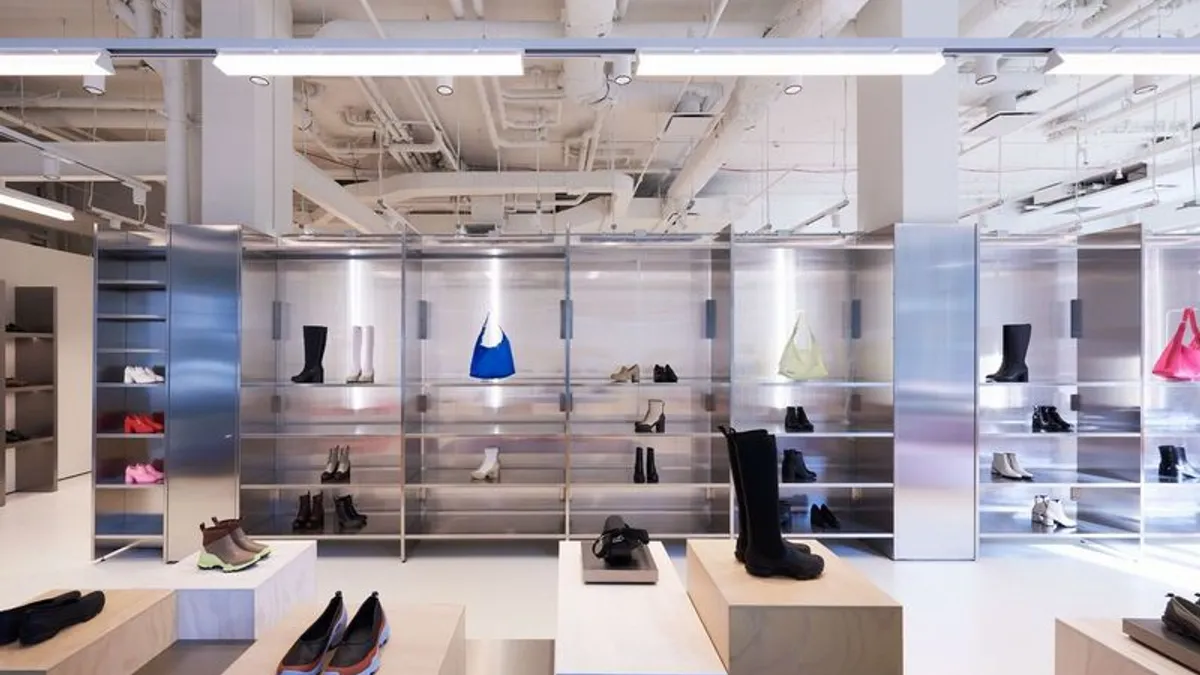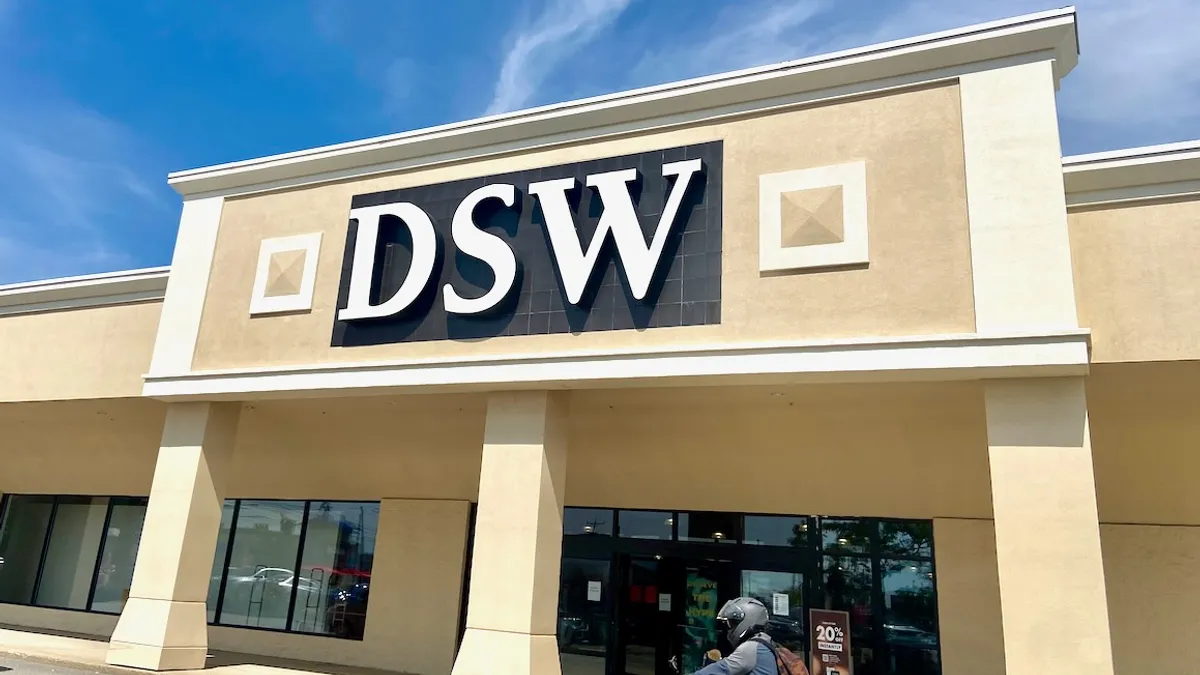It’s been another week with far more retail news than there is time in the day. Below, we break down some things you may have missed during the week, and what we’re still thinking about.
From Haus caviar to the potential disappearance of Zulily, here’s our closeout for the week.
What you may have missed
Peloton allows some members to connect app to third-party treadmills
Peloton may be allowing some members to connect its app to treadmills, even if they’re not Peloton branded.
The fitness company created a support page that included instructions on how its Peloton App+ members could connect the app to any third-party treadmill with Bluetooth FTMS support. The page, however, appears to have been taken down from Peloton’s website and users are now directed to the company’s general support page. Peloton did not immediately respond to Retail Dive’s request for comment on the feature.
Peloton is in the midst of a brand refresh. The company in May announced a new brand identity, aiming to become “more than a bike company.” At the same time, the company introduced an expanded range of tiered content memberships and content features. The three new tiers included Peloton App Free, Peloton App One ($12.99 per month) and Peloton App+ ($24 per month).
Peloton earlier this year also inked a five-year strategic partnership with Lululemon in which Peloton would serve as the apparel brand’s exclusive digital fitness content provider, while Lululemon would be Peloton’s primary athletic apparel partner.
American Freight debuts new store format at two Denver locations
Furniture and appliance retailer American Freight announced a redesigned store format on Dec. 15, according to a press release, which debuted at two of its Denver-area locations. American Freight’s existing Centennial location got a makeover and the company opened a Westminster store, celebrating its grand opening last weekend, showcasing the new layout.
American Freight’s new store format includes AR technology to visualize furniture in homes, trained associates offering personalized assistance, a color-coded system identifying an item’s condition and more.
The company is planning to pilot more stores with the new format during the first quarter of next year before rolling it out nationwide in the third quarter.
Customers buying appliances have the option for American Freight’s installers to deliver, install, test and show them how to use their new purchase.
Ecco opens a store in SoHo
Global footwear and lifestyle brand Ecco announced this week that it has opened a flagship store in the SoHo neighborhood of New York City. The 3,250-square-foot store features the company’s full range of footwear, accessories and some limited-edition products. Aluminum is a key material in the brand’s manufacturing process and a recurring motif within its stores, while the use of plastic is minimized and durable leather is used for the interiors.
The company, which is celebrating its 60th anniversary, also relaunched 16 global flagship stores.
Retail therapy
Haus has entered the caviar game
With holiday parties in full swing, some consumers (OK, the top 1%) are seeking out the best ingredients to serve their guests: truffles, champagne, caviar — and if you’re one of those consumers, might we request an invitation to your next soirée?
Non-alcoholic aperitif maker Haus would like to throw its hat into the ring, but in a more unexpected area. The brand is now pushing out tins of caviar.
The “Siberian Reserve” one-ounce tins of caviar are selling for $99.99 per tin, with further price reductions the more tins you buy. Each tin also comes with a mother of pearl serving spoon.
“Exquisitely sourced from the finest Siberian sturgeon, Haus Caviar offers a luxurious culinary experience,” the website reads. “Characterized by its rich, buttery flavor and firm, succulent pearls, this caviar has a distinctive deep grey to black color, symbolizing its exceptional quality. Each grain bursts with a fresh, clean taste of the sea, a testament to its pristine harvesting and meticulous processing.”
Haus has faced several challenges in recent years. The brand was set to shutter in August 2022 after Constellation Brands — the brewer behind Modelo and Corona — pulled out of a funding round. But Haus found a new home in The Naked Market after it agreed to buy the aperitif maker this past June.
WIlliams Sonoma collaborates with Bridgerton
Williams Sonoma on Tuesday announced that it has partnered with Netflix and Shondaland on a new Bridgerton for Williams Sonoma collection.
Products include picnic baskets, beverage and baking mixes, tableware, artisanal chocolates, and other items that “embrace the Regency-era elegance” the show has become known for, the company said.
“We are proud to partner with Netflix and Shondaland to develop products inspired by the sets, fashion and storylines that have made Bridgerton a global phenomenon, and one of the most watched shows on Netflix,” Williams Sonoma President, Felix Carbullido, said in a statement.
What we’re still thinking about
2026
That’s the earliest year the Federal Trade Commission’s antitrust lawsuit against Amazon may start, according to a court filing this week. The FTC and 17 states sued Amazon In September. But if the case moves forward, it could be two years before a trial, due to the case’s complexity. The FTC and Amazon disagree on when they should be ready. The FTC is estimating May 2026, while Amazon said it could be December of that year or even later.
The lawsuit alleges the e-commerce giant engaged in anticompetitive behavior using punitive and coercive tactics against marketplace sellers to maintain control of a retail monopoly. The lawsuit also accuses Amazon of price fixing.
$1
That’s how much DTC apparel brand Something Navy is reportedly being sold for, according to The Wall Street Journal and other news outlets.
As of press time, the “Be right back” notice on Something Navy’s website was still up, a sign of its downfall. The brand, founded by fashion blogger Arielle Charnas, was riding high a few years ago — Nordstrom inked a partnership in 2015 and ultimately went on to sell $1 million in sales in under 24 hours during the release of a fall capsule collection. The partnership expanded three years later. Now, amid mounting debt and unpaid bills, the brand is reportedly being sold to apparel conglomerate IHL Group and commercial real estate company the Amirian Group for the paltry sum. Something Navy, IHL Group and Amirian Group did not respond to Retail Dive’s request for comment.
The brand is the latest would-be disruptor that has stumbled after early promise. And like others — including Adore Me, Bonobos, Bonobos again, Lively and Parade — Something Navy would be acquired by a legacy retailer. IHL Group runs BCBG Max Azria, Tahari, Daisy Fuentes, Jason Wu and Aéropostale, among others.
What we’re watching
Zulily
Online retailer Zulily appears to have gone out of business or is on the verge of doing so.
Earlier this month, news broke that the company planned to lay off about 800 people in three states. Then the scope and timing of layoffs accelerated. Some employees who originally were told their last day of work would be in February received updated notices from the company that their jobs were ending immediately, according to media reports and their LinkedIn posts.
Earlier this week, the company’s website went offline (and it still is at the time of publication). Since then, the company has been unable to fulfill some customer orders, according to posts on the company’s Facebook page. People complained they couldn’t reach anyone for help because the customer service phone number was also unstaffed. Others recently said while they were unable to contact the company, their orders did eventually get delivered.
Private equity firm Regent LP acquired Zulily from Qurate Retail Group in May. Retail Dive and other media outlets have been unable to reach Zulily or Regent for comment regarding recent events.






















